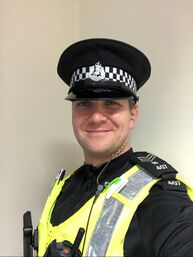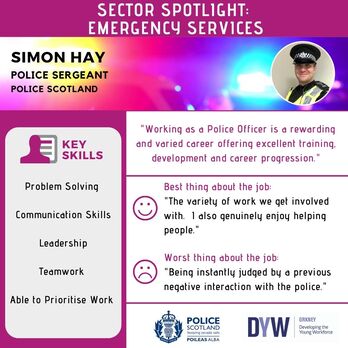 In our final Sector Spotlight on the Emergency Services, we hear from Simon Hay who is a Police Sergeant with Police Scotland in Kirkwall. Simon left school at the end of fourth year and began working as a carpet fitter before taking on a seasonal role cutting grass during the summer. He then started working at the Pickaquoy Centre and during his time there, a work colleague suggested he apply to become a Police Officer. Since joining the police, Simon has worked in Caithness and Orkney in both uniformed and plain clothed roles.  Can you describe a typical day in your role as Police Sergeant? In a word, no. There is no such thing as a typical day in this job. Although most days start with a briefing on incidents that have occurred in Orkney since the last time you were on shift, I would then review all calls, crimes, intelligence and other important updates since I was last on shift. Afterwards, I brief my officers and task them with proactive work as well as ensuring they are maintaining their own workload. I normally attend a few meetings (virtually now) which requires an amount of preparation work and I’m responsible for reviewing and checking my shift’s work. I would also work on my own actions and tasks allocated to me by my supervisors all while responding to any other calls that come in. Some days are more demanding than others, but it is always rewarding. How did you end up in this role? After leaving school with moderate standard grades, I went to work with my uncle as a carpet fitter. I then worked a summer as a grass cutter. After that I went to work at the Pickaquoy Centre and it was during my time there that one of the members of staff, whose husband was in the police said I should go for the police. I never in a million years thought I would end up being a Police Officer. However, I went for it, got in, and now I am here nearly 13 years later and not regretting a second of it. Since joining the Police, I was posted to Wick where I found my feet as a Police Officer. From there, I was successful in my application to be a Detective in the Criminal Investigation Department (CID) dealing with more serious crimes. Prior to Police Scotland there was an opportunity to come home and work in CID in Orkney, I applied and got that job too. Since being in Orkney I have been a Detective in CID, Offender Management Unit (OMU) managing sex offenders in the community, Uniformed Policing, Isles Officer, Preventions and Interventions and now finally a Uniformed Sergeant. What is the best thing about your job? The variety of work we get involved in. The Police tend to be the fall back for most things. If someone doesn’t know who to phone, they phone the Police. Personally, I like the little thank yous, you get. Whether it be for assisting in getting a victim justice for their crime or just listening to someone who needs help and getting them the support, they need. I genuinely enjoy helping people. What is the worst thing about your job? I’ve had to think pretty hard about this as there’s not that much about my job that I don’t like. I guess shift work can take its toll but I’ve worked Monday to Friday and it’s none better. Sometimes you have to note statements about some pretty horrific and traumatic incidents. You also have to attend some fairly gruesome scenes, but I like to be the one that goes to them, as I still want to make sure those victims are receiving the best possible service they can get. Being instantly judged by a previous negative interaction with the police. Sometimes people have had a bad experience with the police and automatically assume we are ‘all the same’ or that I was bullied as a child and I went into this job for a power complex. I say to people if you have a bad experience with a tradesman you don’t hate all tradesmen, do you? What skills do you need to undertake your role? I think the policing values cover the skills you need: Fairness, Integrity and Respect. I like to add being firm, fair and consistent. However, most of our job competencies are listed as follows;
What qualifications do you have?
Other Police specialisms include:
Would you recommend this job to young people, if so why? Absolutely, in return you can expect:
If you're aged 13-17 and considering being a Police Officer you could become a Police Scotland Youth Volunteer (PSYV). You'd attend community and national events across Scotland alongside adult volunteers and serving officers. Being a volunteer could help you understand how policing works in Scotland by participating in your local community. The program is open to all young people aged 13-17. For more information on becoming a youth or adult volunteer with the PSYV, visit: https://www.scotland.police.uk/recruitment/police-scotland-youth-volunteers/ Visit Police Scotland on: Website: https://www.scotland.police.uk/ Facebook: https://www.facebook.com/HighlandIslandsPoliceDivision Twitter: https://twitter.com/OrkneyPolice Comments are closed.
|
Archives
June 2024
Categories
All
|
 RSS Feed
RSS Feed